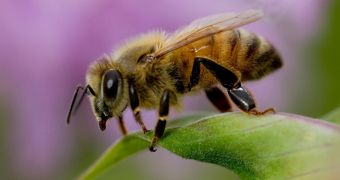This past Thursday, administrator Gina McCarthy with the Environmental Protection Agency in the United States was handed a request signed by over half a million people currently living in said country.
Media reports say that the more than 500,000 folks whose signatures Gina McCarthy got to gaze upon are all concerned about how bees and other pollinators are being treated in the United States.
More precisely, they think that, despite how important they are to the country's agricultural industry and economy, these insects are by no means taken good care of.
What the thousands of environmentalists whose signatures were delivered to Gina McCarthy are upset about is the fact that the Agency's registration review process for two particular pesticides is to extend until 2018.
Eco Watch tells us that the insecticides in question are called clothianidin and thiamethoxam and that they belong to a class of insecticides commonly referred to as neonicotinoids.
Several studies have until now linked neonicotinoids to colony collapse and bee kills, yet, for some reason, the Environmental Protection Agency is taking its time when it comes to banning their use.
“We call on EPA Administrator McCarthy to lead the agency in a new direction by immediately suspending all outdoor uses of neonicotinoid pesticides,” a coalition of environmental groups said in a statement.
Furthermore, “Bees can't wait for four more years for EPA to make a decision. If the agency acts now, we can save these vital pollinators before it’s too late.”
The 500,000 signatures were delivered to the Administrator Gina McCarthy on the one-year anniversary of a lawsuit filed by green groups and beekeepers against the Agency on account of the latter's failure to regulate the use of clothianidin and thiamethoxam.
Interestingly enough, it was back in December 2013 that the European Union ruled to institute a two-year moratorium on some neonicotinoids in order to give its bee population a chance to recover.
The way environmentalists in the United States see things, the country's Environmental Protection Agency should implement several measures without delay.
“We are asking EPA to follow the EU’s lead and recognize that the risks are unacceptably high. Pollination services provided by honey bees and other, even less studied, wild bees are far too important for agriculture and ecosystems to treat them in a non-precautionary manner.”
“Many thousands of beekeeper livelihoods, the future viability of commercial beekeeping and the crops relying on these pollination services, estimated at $20-30 billion [€14.5 – 21.75 billion] annually, are potentially in jeopardy,” they argue.
Until a decision is reached on a national scale, several states are trying to halt the use of neonicotinoids within their territory. Apparently, California, Minnesota, and New York are some of the states that aim to become more bee-friendly in the not too distant future.
Besides, it was earlier this month that Eugene became the United States' first city to roll out legislation that neonicotinoids must not be used on city property.

 14 DAY TRIAL //
14 DAY TRIAL //